Effective contractor management is essential for the success of any project-based business. With the global contractor management software market expected to surpass 4 billion by 2028, it's clear that organizations are increasingly relying on these tools to streamline operations and improve efficiency.
In this post, we will explore the ten best contractor management software solutions for 2024, highlighting their key features and benefits to help you make an informed decision.
What is Contractor Management Software
Contractor Management Software is a powerful digital tool that acts as the command center for handling contractors. It's designed to oversee the complete cycle of contractor engagement, from initial hiring to final payment, all while maintaining essential records. This software includes features such as contractor onboarding, document management, and project tracking, to name a few.
It secures compliance with different regulations and provides a central point for managing every detail related to working with contractors, making it a versatile aid for any business that depends on contracted work.
Why is Contractor Management Software Important
Contractor Management Software is crucial for businesses that employ contingent workers as it provides a structured and consistent approach to managing external staff. Embracing this powerful tool ensures improved contract management accuracy, timely compliance checks, and effective communication channels.
It reduces the likelihood of human error and increases efficiency by automating several manual processes, freeing up your team to focus on more strategic tasks. With the gig economy growing at an unprecedented rate, having a reliable, scalable contractor management system is no longer a luxury but a necessity for staying competitive and compliant.

Benefits of Contractor Management Software
Contractor management software offers many advantages for businesses. Here are some key benefits to consider.
Streamlines Contractor Hiring and Onboarding Processes
Contractor Management allows you to efficiently onboard contractors, ensuring they complete all necessary steps, from signing contracts to undergoing training, in record time. This software eliminates the cumbersome nature of manual onboarding and also lends a welcoming and professional first impression to your new contractors.
Improves Compliance and Regulatory Adherence
Contractor Management Software ensures contractors have the necessary certifications, licenses, and training to comply with local and international regulations. It tracks and verifies contractor certifications and expirations, manages compliance documents with the ability to approve or reject submissions efficiently, and sends automatic alerts for upcoming certification renewals or compliance deadlines.
With these functionalities, the software becomes an indispensable asset for Risk and Compliance Officers, protecting the company against potential legal and financial repercussions.
Facilitates Better Communication and Project Coordination
A robust Contractor Management Software enables clear interaction between your internal team and contractors. It serves as a centralized communication hub, streamlining project coordination by providing integrated messaging systems for quick, direct discussions, sharing real-time updates, and offering tools for scheduling and coordinating meetings.
Offers Real-Time Access to Contractor Data and Analytics
Contractor Management Software gives you a live overview of your outsourced workforce, enabling you to make informed decisions swiftly. It generates comprehensive reports on contractor performance and project costs, tracks real-time analytics on site maps, offers oversight of contractor and visitor statuses, and visualizes data trends to assist in strategic planning and optimizing contractor utilization. These analytics features provide a foundation for proactive management and continuous improvement.
Improves Scheduling and Availability Management
Contractor Management Software is your all-in-one solution for ensuring contractors are where they need to be when they need to be there. The software allows you to create and distribute schedules with drag-and-drop simplicity. It lets contractors view their assignments and submit availability digitally, manages conflicts and sends alerts to prevent double-booking and scheduling errors. This improved scheduling capability keeps your projects on time and your contractors informed, reducing downtime and maximizing productivity.
Simplifies Payment and Invoicing Procedures
Contractor Management Software provides a straightforward approach to managing invoices and ensuring timely payments. It smooths out the payment process by automating invoicing, cutting down on manual entry and the risk of errors. It also supports bulk invoicing and scheduled, recurring payments for regular contractors and manages employer-initiated invoices, giving you greater control and flexibility. The software helps maintain positive relationships with contractors through prompt and accurate payments by streamlining these processes.
Increases Accountability with Digital Time Tracking
Contractor Management Software revolutionizes how you monitor work hours. It employs GPS-driven timecards, ensuring accuracy in location and hours spent on-site. It also facilitates the time-sheet approval process and enables you to cross-reference productivity data. This feature offers valuable insights into project progress and contractor efficiency.
Promotes Safety with Training and Certification Management
Contractor Management Software ensures a safe work environment by managing training and certifications. It does this by providing platforms for eLearning and safety inductions, ensuring contractors are well-informed before stepping onsite. It also monitors certification expiry dates with automated notifications for renewals and triggers alerts if a contractor attempts to access a restricted area without the proper safety credentials. This proactive approach to safety can drastically reduce workplace incidents, keeping both your projects and your people protected.
Integrates with Existing HR and ERP Systems
With seamless integration capabilities, Contractor Management Software meshes well with major HR and ERP systems, like SAP, Maximo, and Oracle, functioning as an extension rather than a separate entity. It also ensures that data flows smoothly between systems, eliminating the need for duplicate entries and reducing the likelihood of errors. It facilitates a unified view of contractor and employee information, streamlining processes and decision-making.
Provides Scalable Solutions for Growing Businesses
This software adapts to your expanding contractor base and escalates data volumes. It handles an increasing number of contractors and transactions without sacrificing performance, easily expands functionalities and user limits as your business needs evolve, and minimizes disruptions during scaling, maintaining operational continuity and data integrity.
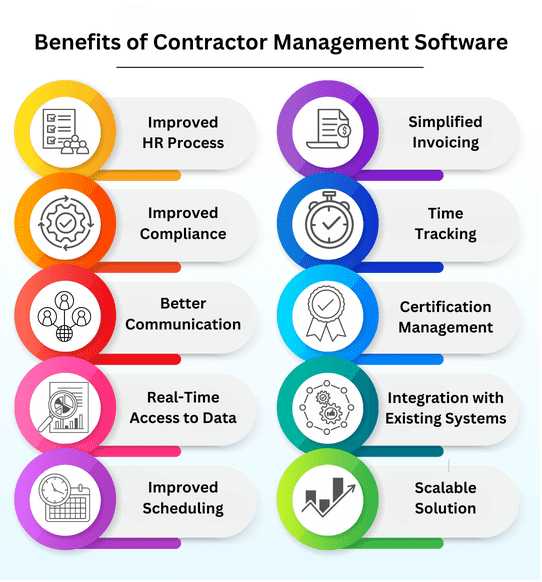
Top 10 Contractor Management Software Solutions
Here's a list of the top 10 contractor management software solutions that streamline operations and improve project efficiency.
1. Kohezion

Kohezion offers a no-code platform that revolutionizes the way businesses manage contractors. Praised for its flexibility and ease of use, Kohezion stands out for its intuitive interface and customizable features.
Top 5 Features:
- Tailors applications to fit your specific contractor management needs with no coding required
- Boasts an impressively user-friendly drag-and-drop interface
- Offers powerful data reporting and visualization tools
- Ensures secure data handling and access controls
- Provides dedicated customer support and online learning resources
Benefits:
- Improves productivity by enabling businesses to quickly adapt the software to their processes
- Reduces dependency on IT resources for application development
- Provides real-time insights to help make better-informed decisions
- Keeps critical data protected while providing controlled access
- Offers personalized support to ensure users get the most out of the platform
Cons:
- May have a learning curve for users completely new to no-code platforms
- The sheer number of customizations available might initially overwhelm some users
Best For: Businesses looking for a flexible, scalable solution to contractor management that can be effortlessly tailored to their unique requirements, especially those with limited IT resources.

2. Bridgit

Bridgit takes contractor management to the next level, especially for general contractors. It offers tools designed to streamline workforce management. With a focus on simplicity and visibility, Bridgit is a go-to for many developers and project managers across the construction industry.
Top 5 Features:
- Robust forecasting and reporting to anticipate future project needs
- Easy-to-use remote planning capabilities for teams on the go
- Effective risk management tools to mitigate potential workforce issues
- Seamless integration with other software tools for a streamlined workflow
- Mobile-friendly design for iOS and Android, keeping you connected in the field
Benefits:
- Helps you plan and allocate resources more efficiently with advanced forecasting
- Facilitates better decision-making with comprehensive reports
- Minimizes the risks associated with contractor management
- Improves productivity with the convenience of mobile access and remote planning
- Improves collaboration among team members, irrespective of their location
Cons:
- No free version is available, which may be a barrier for some small businesses or freelancers
- Pricing information is not transparent and needs to be requested
Best For: General contractors and developers who require a high degree of oversight and reporting for their workforce and appreciate having remote access to their management tools on different devices.
3. ClickUp
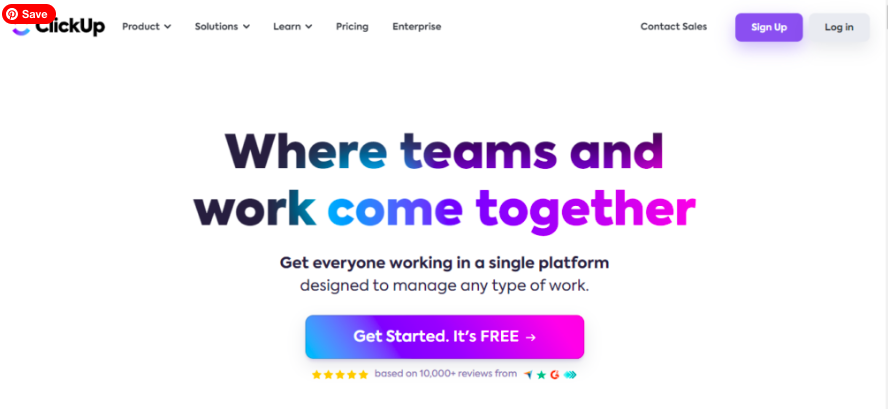
ClickUp is a dynamic project management tool that incorporates contractor management seamlessly into its suite of services. It's known for its adaptability and features that cater to a wide range of industry needs. For both the uninitiated and the seasoned project managers, ClickUp offers an accessible yet powerful platform.
Top 5 Features:
- Global time tracking to monitor contractor activities from anywhere
- Integrations with over 1,000 tools, including financial software and communication apps
- Customizable project timelines and freelancer timesheets tailored to your needs
- Accessible across devices with browser, desktop, and mobile app support
- Extensive library of templates to quickly set up tailored contractor management workflows
Benefits:
- Helps keep tight rein on time management and budgeting for projects
- Streamlines processes with integrations, minimizing the need to switch between apps
- Offers flexibility in managing timelines and tracking contractor engagements
- Supports an on-the-go workforce with cross-platform accessibility
- Accelerates setup and adoption with ready-made templates for different project needs
Cons:
- The multitude of features and customizations can be overwhelming for new users
- Occasional notifications can become distracting if not properly managed
Best For: Organizations seeking to manage contractors and projects under a unified platform, particularly appealing for teams that rely heavily on integration with other digital tools. ClickUp is suited for both small startups and large enterprises looking for versatility and control over their contractor management.
4. Ventus

Ventus is known for its robustness and critical industry-specific functionality, Ventus brings a disciplined, process-oriented method to contractor oversight.
Top 5 Features:
- Dynamic contractor portals that simplify document submissions and workflow approvals
- Comprehensive contractor prequalification to maintain high safety and performance standards
- Deep analytics for tracking contractor performance and trend analysis
- Strategic risk management tools to identify and mitigate potential project issues
- Advanced communication platforms that keep all stakeholders in sync
Benefits:
- Facilitates compliance and reduces administrative burdens through efficient contractor prequalification
- Delivers actionable insights to optimize performance and minimize risks
- Encourages consistent communication, limiting the likelihood of mismanaged projects
- Strengthens control over the entire contractor lifecycle, from onboarding to offboarding
- Guarantees that operational standards are upheld across different contractor tiers
Cons:
- Complexity of features may result in a steeper learning curve for some users
- May require significant setup time to align with company-specific processes
Best For: Large-scale enterprises with complex contractor management needs demanding rigorous prequalification processes and high performance analytics. It's a prime choice for construction, oil and gas, and energy sectors.
5. Lusha
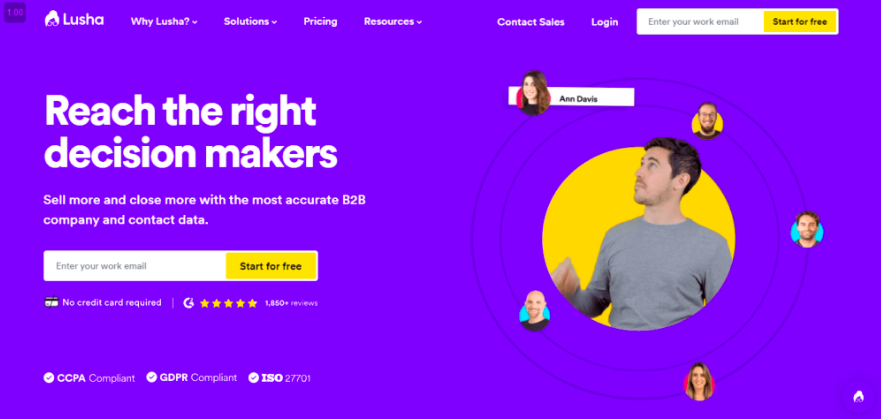
While not a conventional choice for handling contractors, Lusha's strong suit is its ability to pinpoint accurate contact information, making it indispensable for recruitment and contracting in B2B scenarios.
Top 5 Features:
- An extensive database of B2B contact information for sourcing candidates
- Seamless CRM integration for up-to-date contact records
- Compliance with security and privacy regulations ensuring data protection
- Streamlining onboarding processes for rapid setup and use
- Automated updates to CRM, maintaining a fresh and accurate database
Benefits:
- Reduces the time and costs associated with finding and verifying candidate contacts
- Simplifies the recruitment process, allowing for a focus on high-quality hires
- Maintains compliance, offering peace of mind when dealing with sensitive contact data
- Automates mundane tasks, improving productivity and resource allocation
- Offers a free version that businesses can use to evaluate its potential value
Cons:
- Lusha's free plan is quite limited, offering only five credits per month for a single user, which can be quickly exhausted
- The platform doesn't have native mobile or Linux support, which might limit accessibility for some teams
Best For: Companies that require a dependable resource for B2B contractor and candidate sourcing, particularly those in sales, marketing, and recruitment. It's best suited for teams that need quick and reliable access to verified business contact information.
6. Fieldwire

Fieldwire is acclaimed within the construction sector for its detailed task management and field-focused functionality. It's tailored to the dynamic needs of job sites, where real-time coordination and communication are critical.
Top 5 Features:
- Optimized for field use with a mobile-first approach
- Real-time messaging to keep everyone in the loop
- Task punch lists with media documentation for streamlined inspections
- Scheduling and reporting features to keep project timelines in check
- Support for custom fields to track unique data relevant to your projects
Benefits:
- Empowers teams with immediate information access on the ground, enhancing decision-making and response times
- Facilitates effective communication between office and field staff, bridging gaps that can derail projects
- Offers a detailed visual record of tasks, aiding in quality control and accountability
- Assists in maintaining project schedules with robust planning tools, avoiding delays
- Provides flexibility to capture project-specific information through customizable data fields
Cons:
- Can be heavy on data usage, which could be a concern for users with limited mobile data plans
- Some users may find the interface requires time to get accustomed to, particularly for those less tech-savvy
Best For: Developers, designers, and contractors seeking an all-in-one job site tool that prioritizes in-field communication and task management. It's particularly suited for construction professionals who require quick information sharing and detailed project documentation from any device.
7. BuilderTrend

BuilderTrend caters particularly well to construction managers and building professionals. Designed to harmonize team collaboration and client updates, it allows you to manage everything from scheduling to client communication from one comprehensive platform.
Top 5 Features:
- Intuitive scheduling and daily logs keep project timelines on track
- In-depth work-in-progress reporting with document and photo storage capabilities
- A customer portal that includes messaging for direct, transparent client communication
- A plethora of integration options with other platforms to streamline operations
- Robust mobile applications for iOS and Android to manage on-the-go
Benefits:
- Creates a more seamless workflow between office and field teams with real-time updates
- Strengthens client relationships with continuous and coherent communication
- Organizes all project documentation in one secure, easily accessible location
- Enables a higher level of oversight and control over project management aspects
- Supports remote team coordination through sturdy mobile apps
Cons:
- The monthly pricing of $399 for the Essential plan could be steep for smaller companies or individual contractors
- Lacks a free version, which could prove a barrier to those wanting to trial the software before committing
Best For: Construction businesses looking for an all-in-one solution to align teams, keep clients in the loop, and manage different aspects of the construction process from a single platform. It's particularly useful for those who value the support of powerful mobile applications in their workflow.
8. Autodesk Construction Cloud
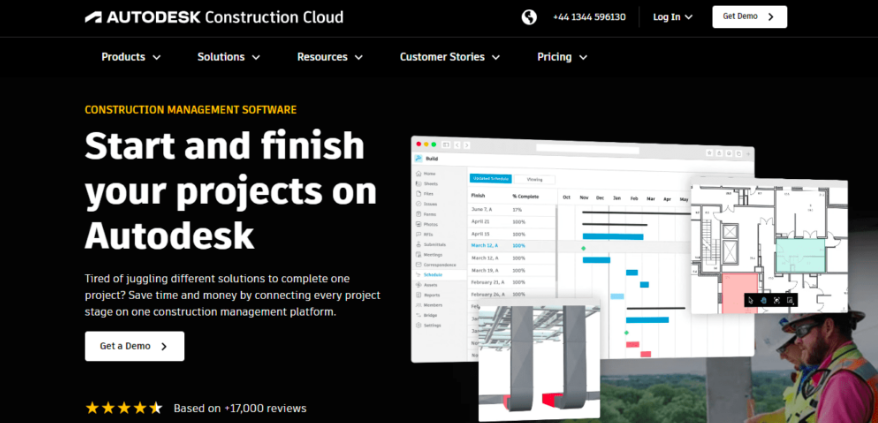
Autodesk Construction Cloud provides an advanced, integrated suite for the entire construction lifecycle. Known for connecting data, workflows, and teams across different projects, its comprehensive approach is a hit with large builders and construction firms.
Top 5 Features:
- Connects operations with centralized document management and communication platforms
- Delivers predictive insights and industry-leading builders network integration
- Streamlines cost control for budgeting, expenses, and change orders
- Offers a free version through PlanGrid Build, tailored for smaller projects and team collaboration
- Supports different platforms, including web, iOS, and Android, for accessibility on any device
Benefits:
- Fosters collaboration among teams, ensuring everyone is on the same wavelength
- Provides critical data and insights to preemptively address pitfalls in project management
- Streamlines financial aspects of contracting, contributing to increased profit margins
- Offers adaptability with a free tier for those testing the waters or handling small-scale operations
- Ensures you’re never out of the loop, with cross-platform support keeping you connected to your projects
Cons:
- The robust nature of the software might have a steeper learning curve
- Annual billing cycle for the paid tiers could be a financial stretch for some smaller businesses
Best For: Mid-sized to large construction firms looking for rich, connected solutions to manage their contractor relationships and projects. It's best for those who appreciate comprehensive data integration and predictive analytics within their software toolkit.
9. QuickBooks Online
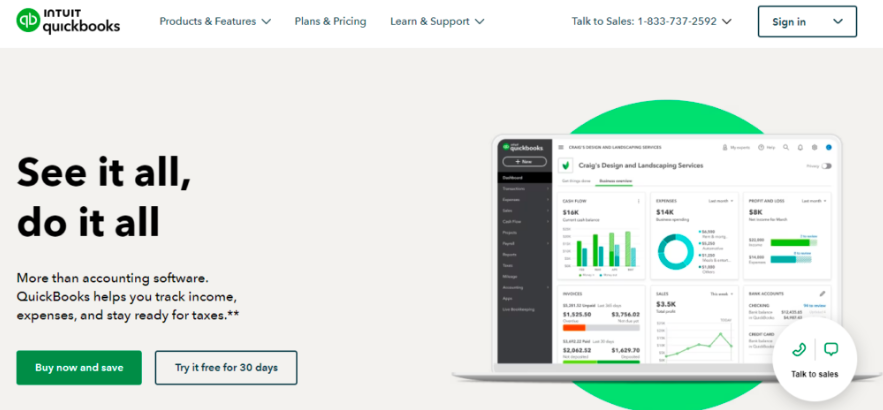
QuickBooks Online is known for its robust accounting capabilities. It's a go-to for many small to medium-sized businesses due to its ease of use and integration with other systems.
Top 5 Features:
- Streamlined accounting with the ability to track expenses, manage invoices, and process payroll for contractors
- Syncs with major banks and applications for real-time financial updates
- Provides detailed reports and dashstills for insight into contractor costs and project budgets
- Offers customized billing through estimates and invoices that can be converted to projects
- Mobile app that allows you to manage contractors' financial data on the go
Benefits:
- Ensures financial accuracy and saves time on contractor payment processing
- Centralizes financial data, making it easily accessible for quick decision-making
- Facilitates financial control and oversight over contractor expenses and profitability
- Improves professional reputation with custom, branded billing communications
- Supports financial management while out of the office through the mobile application
Cons:
- Can be considered pricey for the full suite of features, potentially impacting small business budgets
- Specific contractor management features may not be as comprehensive as specialized software
Best For: Contractors and business owners looking for a reliable financial tool that simplifies accounting tasks associated with managing contractors. Particularly useful for those who require real-time financial monitoring and seamless integration with their banking systems.
10. Jobber

Jobber is an invaluable solution for small businesses, particularly in the home service industry. Specialized tools within Jobber support a variety of contractor management tasks, from scheduling and client coordination to financial documentation.
Top 5 Features:
- Customizable job scheduling and dispatching tools for seamless operations
- Client relationship management features that include client reminders and follow-ups
- Mobile app functionality to manage on-site services and client communications on the fly
- Streamlined payment processing with online invoicing and automatic payment reminders
- Comprehensive reporting capabilities to analyze service performance and financial health
Benefits:
- Creates efficient scheduling and dispatching, optimizing contractors' time and resources
- Improves client satisfaction through timely communications and ease of payment
- Ensures operational flexibility with robust mobile platform access
- Helps maintain cash flow with quick invoicing and payments
- Provides valuable business insights to aid in growth and service improvement
Cons:
- Pricing may escalate quickly with additional features and users, potentially stretching budgets for smaller operations
- Some niche service businesses may require more specialized features than those offered
Best For: Home service companies that manage a roster of regular contractors and prioritize a high level of customer interaction. It's an excellent choice for businesses that value both operational efficiency and robust financial reporting.
Top Features in Contractor Management Software
When selecting contractor management software, it's important to consider the key features that will best support your needs. Here are the top features to look for.
Centralized Contractor Database and Profiles
A Centralized Contractor Database stores all contractor information, including contact details, qualifications, and work history, in one secure location. This feature enables quick access, efficient searching and filtering, customizable fields, and document storage for certifications and agreements, keeping everything organized and easily accessible.
Compliance Tracking and Document Management
Contractor management software ensures all compliance requirements are met by centralizing document storage. It streamlines the tracking of certifications, licenses, and safety records. This helps reduce the risk of non-compliance and related fines.
Time Tracking and Labor Management
Accurate time tracking and labor management features help monitor contractor hours and project timelines. The software simplifies scheduling, ensuring optimal workforce allocation. This improves productivity and reduces labor costs.
Billing, Invoicing, and Payment Processing
Automated billing and invoicing features facilitate prompt and accurate payment processing. The software generates detailed invoices, tracks payment status, and reduces errors. It also helps maintain positive cash flow and contractor satisfaction.
Communication and Collaboration Tools
Effective communication and collaboration tools keep all project stakeholders informed. The software supports real-time messaging, file sharing, and task management. This ensures everyone is on the same page and project milestones are met.
Reporting and Analytics
Comprehensive reporting and analytics provide insights into project performance and contractor efficiency. The software generates customizable reports to help identify trends and areas for improvement. This data-driven approach supports better decision-making and strategic planning.
Mobile Access and App Functionality
Mobile access and app functionality enable contractors and managers to stay connected on the go. The software allows users to access project information, track progress, and communicate from any location. This flexibility improves responsiveness and project management efficiency.
Integration Capabilities with Other Software Systems
Seamless integration with other software systems ensures a unified workflow. The software connects with accounting, payroll, and project management tools, reducing data silos. This integration improves operational efficiency and accuracy across the organization.

Trends in Contractor Management Software for 2024
As we look ahead to 2024, advancements in contractor management software are shaping the way businesses streamline operations and improve efficiency. Here are the emerging trends to watch in the year ahead.
Integration with Cloud-Based Services
Contractor management software is increasingly integrating with cloud-based services to provide real-time access to project data. This trend supports remote work and collaboration, allowing teams to stay connected from anywhere. Cloud integration also ensures data is securely backed up and easily accessible.
Improves Security Measures and Data Protection
There is a growing focus on improved security measures and data protection in contractor management software. Advanced encryption, multi-factor authentication, and regular security audits are becoming standard. These measures help safeguard sensitive contractor and project information against cyber threats.
Incorporation of Artificial Intelligence and Machine Learning
Artificial intelligence (AI) and machine learning (ML) are being incorporated to improve efficiency and decision-making. These technologies help predict project outcomes, optimize schedules, and identify potential issues before they arise. AI and ML improve the software's ability to provide actionable insights.
Sustainability Tracking and Reporting Tools
Sustainability tracking and reporting tools are gaining prominence in contractor management software. These tools help organizations monitor their environmental impact and adhere to sustainability goals. They provide detailed reports on resource usage, waste management, and carbon footprint, supporting eco-friendly practices.
How Much Does Contractor Management Software Cost?
The cost of contractor management software varies depending on features, the number of users, and the scale of the implementation. Typically, pricing models include monthly or annual subscription fees, which can range from $20 to $200 per user per month.
Some providers offer tiered pricing based on the level of functionality, with more advanced features commanding higher fees. Implementation costs, training, and customer support might also influence the expense. Evaluating your organization's specific needs and comparing options can help determine the most cost-effective solution.
Manage Your Contractors with Kohezion
Kohezion is a contractor management software offers robust tools for automating tasks such as scheduling, time tracking, and compliance management. It helps reduce manual errors and increases efficiency, allowing your team to focus on more strategic activities. Kohezion's customizable platform can adapt to the specific needs of your projects, providing a seamless and efficient workflow.
Conclusion
Choosing the right contractor management software is crucial for streamlining your operations and improving efficiency. The ten tools highlighted for 2024 offer a range of features to help manage your projects, track compliance, and improve collaboration. Evaluate each option based on your specific needs to find the best fit for your organization. For more information on how Kohezion can help improve your automation processes, contact us today.
Start building with a free account
Frequently Asked Questions
Yes, contractor management software is suitable for small businesses. It can help streamline operations, reduce administrative burdens, and improve project management. Many solutions offer scalable pricing and features that can be tailored to the needs of smaller organizations.
Contractor management software facilitates project tracking by providing real-time updates on progress, timelines, and resource allocation. It offers tools for monitoring tasks, milestones, and deadlines, ensuring that projects stay on schedule. Detailed reporting and dashboards allow for easy tracking of project performance and quick identification of any issues.
Contractor management software is designed with robust security measures to protect sensitive information. It typically includes advanced encryption, multi-factor authentication, and regular security updates. These features help ensure that data remains confidential and secure from unauthorized access and cyber threats.
Transitioning from traditional methods to using contractor management software involves several steps. Start by identifying your specific needs and selecting a software solution that matches them. Then, plan for a phased implementation, providing training and support to your team to ensure a smooth adoption process. Gradually migrate your data and processes to the new system, ensuring all stakeholders are comfortable with the changes.
